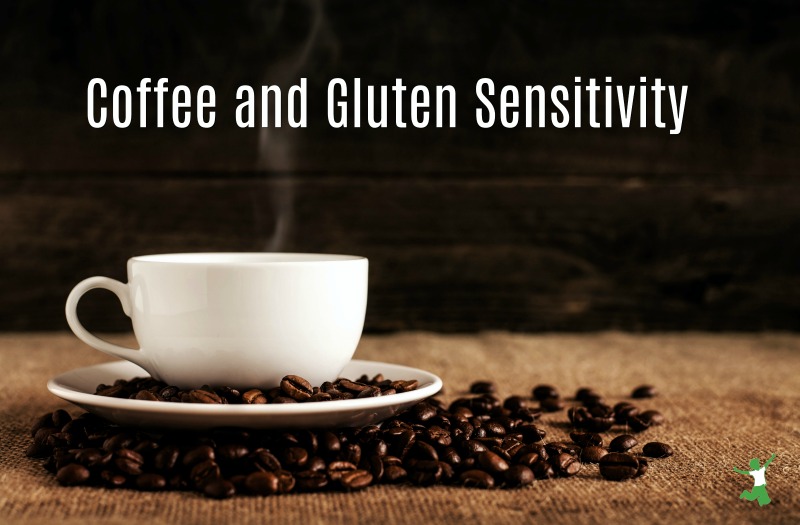Table of Contents[Hide][Show]
Coffee should be avoided by those who are Celiac and many who suffer from wheat sensitivity as it contains cross-reactive proteins to gluten.

If you drink coffee, even bulletproof coffee and have gluten sensitivity or celiac, you might want to sit down for this one.
There is a surprising connection between gluten and coffee that is by and large ignored by the health community. This revelation holds ramifications for other autoimmune disorders as well.
The problem has nothing to do with caffeine, so decaf coffee would be included in this discussion.
In a nutshell, fairly recent lab research has revealed that 10% of coffee is a protein that cross-reacts with gluten antibodies.
This means that if you are gluten sensitive or celiac and are avoiding gluten-containing grains or perhaps have even gone completely grain-free if you still drink coffee there is a strong likelihood that the protein in the coffee is triggering the very same gluten-related health problems you are trying to avoid.
In other words, even if you think you are doing fine with your current gluten-free diet, it is very possible that skipping the coffee could take your health to the next level.
Symptoms of Gluten Sensitivity
Most people who are gluten sensitive don’t realize it because gastrointestinal problems like burping, gas, tummy upset, or toilet issues are the least common way for gluten issues to present themselves!
The most common symptoms of gluten sensitivity?
Migraines and other neurological issues – even MS!
Hormone and endocrine problems are another common way for gluten issues to manifest themselves.
How Coffee Triggers Gluten Sensitivity
So what exactly happens when a gluten sensitive person eats gluten?
Folks with gluten antibodies react to any gluten in the diet by mounting an immune response. This means that gluten is perceived by the body as an invader and the gluten antibodies attack the gluten itself trying to destroy it. This gluten attack is an inflammatory response and inflammation issues can occur anywhere in the body in any tissue or organ.
Here’s the real shocker I came across when researching the coffee/gluten connection:
According to Dr. David Clark DC, functional neurologist and endocrinologist:
There’s not a disease or health condition you can think of that does not have an association – in the research literature – with gluten sensitivity.
That’s a very strong statement!
In essence then, if you are gluten sensitive in any way shape or form, and it seems that most people are whether they know it or not given the epidemic levels of autoimmune issues today, gluten antibodies have the potential to react to proteins in other foods as if they are gluten thereby triggering an immune and inflammatory response.
The protein in coffee is the most common cross-reactor for gluten. Because it is the protein in the coffee that is the trigger, switching to decaf coffee does not solve the problem. Apparently, instant coffee is the worst offender.
Is it possible to be gluten sensitive and not cross-react to coffee? Yes, it’s possible but you’ll have to do some expensive lab testing with a knowledgeable doctor to find out.

Reference
Journal of Food and Nutrition Sciences
More Information
You Probably Need to Change WHEN You Drink Coffee
Coffee Enema
Morning Coffee Fix
Caffeine and Chronic Back Pain
Healthy Coffee Substitutes







I read about this before, I have to say..I feel so much better without it 🙂 🙁
If it was anything but coffee…
Makes… Me… So… Sad!!!!!! My treat, my last bit of me from my old ways of eating… Nooooo!!! 🙁
It appears the writer and researcher are lumping gluten sensitivity and Celiac all in one big sentence. Gluten Sensitive people do NOT produce the antibodies. Celiacs produce the antibodies. Someone needs to understand the difference as it’s pretty huge.
Definitions from the Center of Celiac Research (celiaccenter.org):
What is gluten sensitivity?
As the word “sensitive” suggests, gluten sensitivity is a reaction to ingesting gluten, which is found in wheat, barley and rye. Symptoms can arise throughout the body and range from fatigue and “foggy mind” to diarrhea, depression and joint pain.
How does gluten sensitivity differ from celiac disease?
Although symptoms (particularly gastrointestinal) are often similar to those of celiac disease, the overall clinical picture is less severe. Recent research at the University of Maryland Center for Celiac Research shows that gluten sensitivity is a different clinical entity that does not result in the intestinal inflammation that leads to a flattening of the villi of the small intestine that characterizes celiac disease. The development of tissue transglutaminase (tTG) autoantibodies, used to diagnose celiac disease, is not present in gluten sensitivity
I find this very interesting. Last year I was told to get off gluten immediately. Months later my doctor ran a blood test that said I should also avoid coffee. It sounded odd, but I took has advice….glad I did.
I’ve never heard of Coffee being an issue for those with Celiac, at least I never had an issue. Recently I’ve switched to energy “shot” products. I take about one a day (Eternal energy shot, can get at walmart), and I feel great and haven’t had any negative side effects. I guess each to his own, but just thought I would comment and share my two cents.
-Anna